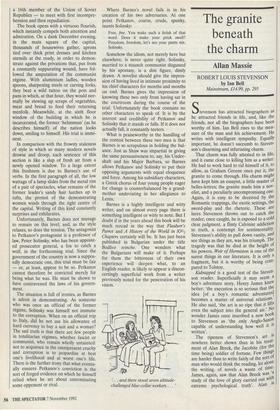The granite beneath the charm
Allan Massie
ROBERT LOUIS STEVENSON by Ian Bell
Mainstream, £14.99, pp. 295
Stevenson has attracted biographers as he attracted friends in life, and, like the friends, not all the biographers have been worthy of him. Ian Bell rises to the mea- sure of the man and his achievement. He writes with intelligent sympathy. Equally important, he doesn't succumb to Steven- son's disarming and infuriating charm.
That charm was fully attested to in life, and it came close to killing him as a writer. He had to work hard to rid himself of it, to allow, as Graham Greene once put it, the granite to come through. His charm might have kept him an essayist, a little master of belles-lettres; the granite made him a nov- elist, and a peculiarly uncompromising one. Again, it is easy to be deceived by the Romantic trappings, the exotic settings, the sword-play and the rhetoric. These are lures Stevenson throws out to catch the reader; once caught, he is exposed to a cold clear judgment, a flinty Calvinist addiction to truth, a contempt for sentimentality. Stevenson's ability to pull down vanity, and see things as they are, was his triumph. The tragedy was that he died at the height of his powers. Weir of Hermiston is one of the surest things in our literature. It is only a fragment, but it is worthy of being coin' pared to Tolstoy.
Kidnapped is a good test of the Steven- son reader. Superficially it may seem a boy's adventure story. Henry James knew better: 'the execution is so serious that the idea [of a boy's romantic adventures], becomes a matter of universal relations. He also said, 'the art is so ripe that it lifts even the subject into the general air. No wonder James once inscribed a new book to Stevenson as 'the only Anglo-Saxo.n capable of understanding how well it Is written'. The ripeness of Stevenson's art is nowhere better shown than in his treat- ment of Alan Breck, the Jacobite (for .the time being) soldier of fortune. Few things. are harder than to write fairly of the sort ot man who would think the reading, let alone the writing, of novels a waste of tim,e. James, again, saw that Alan Breck was study of the love of glory carried out With extreme psychological truth'. Alan is absurd, yet heroic; duplicitous, yet rings true.
Ian Bell is more concerned with the life than with criticism, though he observes cor- rectly that Stevenson is a writer 'whose life and work refuse to be separated'. He makes better use of the autobiographical pieces (The Amateur Emigrant, Across the Plains, etc) than of the novels. Stevenson was a writer, or he was nothing; yet like many good writers, he would rather have been a man of action.
His wretched health made that impossi- ble. The succession of haemorrhages, the weeks, even months, confined to bed, are wearisome to read of; how much worse to live. They didn't prevent him from writing the first draft of Dr Jekyll and Mr Hyde (a book Nabokov adored) in three days; 30,000 words in three days: try it. Ian Bell comes from Edinburgh himself, and is very good on the Edinburgh back- ground. He has the sense and good taste to refrain from presenting Scots Presbyterian- ism as unrelieved gloom. He sees, as Stevenson (and, more surprisingly Rose- bery, almost an exact contemporary), saw, the beauty of austerity. He understands the frustrations also; yet he is very fair to Stevenson's long-suffering father, who saw his son reject his creed, and yet continued to support him financially. He is good, too, on the strange marriage. Fanny Stevenson was ten years older than Louis. She was highly-strung, possessive, a difficult woman. She was married when they met, with a daughter almost grown-up and a teenage son. Yet he pursued her from Scotland to California.
His London friends disliked her. They thought with some reason that she kept them from him. She was responsible indi- rectly for his break with W. E. Henley, who had inspired the character of Long John Silver. Mr Bell is no more than fair to Fanny (no biographer has found it easy to be more than fair to her), but he dislikes Stevenson's London friends, especially Henley. There was more to Henley than he will grant, and Henley had some justice on his side in the quarrel with Stevenson. Mr Bell goes further still; he fathers on Steven- son an Anglophobia which is perhaps his OWn.
Excellent in its treatment of Stevenson, the book is deficient in the author's judg- ments of others. Henry Adams, for instance, is dismissed as 'absurd' and 'a Pompous ass'; perhaps Mr Bell is ignorant of that remarkable novel Democracy, even of The Education of Henry Adams? To call George Meredith's influence 'pernicious' suggests that he hasn't in fact read Mered- ith.
These faults are venial, if irritating. There will be other biographies of Steven- son as the centenary of his death (1894) aPproaches. They will have to be very good to supplant Mr Bell's, to surpass his under- standing of Stevenson's background and Complicated psychology.











































































 Previous page
Previous page